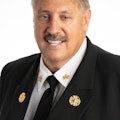I really think the fire service missed an excellent opportunity when it came to the recently signed health care reform bill. Regardless of your political position on whether the legislation is a good or a bad thing, I believe we missed a tremendous chance to change how EMS is delivered by the fire service.
There is no doubt that the fire service is one of the largest players in health care delivery in this country. Many patients who are seen at hospitals are first touched by the hands of a firefighter, either during a first-responder call or during transport to a hospital. I am sure this happens over a 100,000 times a day in the United States.
If the whole idea was "reform," we did not "reform" anything related to EMS, although EMS is the major introduction for many people into the nation's health care system. It looks like what mainly will impact EMS in some 2,500 pages of legislation is an extension of the 2% urban, 3% rural and super-rural bonuses for ground ambulance service providers. Big deal! Where real health care reform could have started would have been to shift the paradigm of delivering EMS.
We have been following basically the same model for over the past 40 years: The ambulance responds to the scene and the patient is treated by personnel assigned to the ambulance, placed on a stretcher, loaded into an ambulance and taken to a hospital. The legislation signed by President Obama in March could have included funding for pilot programs to look at how firefighter/paramedics on first-responder engine companies could treat and release someone at the scene instead of transporting everyone to emergency rooms (many of which are already overcrowded without adding another 32 million insured people into the equation). With these programs of treat and release, the fire service could be given incentives by Medicare, Medicaid or private insurance companies to keep people from going to emergency rooms. The fire service under this type of program would actually save millions for Medicare, Medicaid and private insurance companies, since there would be no bills from hospitals for emergency room visits. It may require training paramedics with a few additional skill sets, but it is not impossible.
The legislation signed by President Obama also could have reimbursed ambulance services for taking patients to other care facilities instead of to emergency rooms. Ambulance services are incentivized to take people to emergency rooms, since they only are reimbursed for transports to an emergency room — which is one of the most expensive forms of care. What would happen if ambulance services were reimbursed for transporting many of the non-acute patients who call 911 to clinics or other lesser form of care? Again, we would save millions for Medicare, Medicaid and private insurance companies by not incurring bills for emergency room visits. Incidentally, we would help with the overcrowding of emergency rooms.
These are just some of the examples of how the fire service could have played a major role in the reform of health care in this country — and I can think of more, including having the U.S. Fire Administration (USFA) administer these programs (with increased funding, of course) under its newly charged mission of EMS. In these times of economic difficulties for the fire service, these programs could have increased/maintained staffing and increased revenues.
What about other possibilities? We could have mandated and funded health-and-wellness physicals for each firefighter each year. About 50% of firefighter line-of-duty deaths each year are cardiac related, and who knows about cancers that are believed to be related to the job, but cannot be proven? The key to successful treatment of cardiac disease and cancer is early detection. There are plenty of success stories from fire departments around the country that tell of someone who was detected with cancer and did not know it or someone who was one platelet away from a heart attack and had no idea.
The last time there was this type of major legislation was in 1965 with the passage of Medicare. Before that, it was Social Security in 1937. Landmark legislation does not come along very often.
It may be too late for the fire service — or maybe not. The news is filled with reports of other bills being introduced and possibly a repeal of this legislation by the Supreme Court after the states get done making their case. If that happens, maybe they will start all over again or modify the existing legislation. However, I think we as a fire service can do better than what we did, as we are such a major player in health care delivery in this country. The question remains — is it too late?
GARY LUDWIG, MS, EMT-P, a Firehouse® contributing editor, is a deputy fire chief with the Memphis, TN, Fire Department. He has 32 years of fire-rescue service experience. Ludwig is chairman of the EMS Section for the International Association of Fire Chiefs (IAFC), has a master's degree in business and management, and is a licensed paramedic. He is a frequent speaker at EMS and fire conferences nationally and internationally, and can be reached through his website at www.garyludwig.com.
About the Author
Gary Ludwig
GARY LUDWIG has served in three fire departments over his career: St. Louis, Memphis, and Champaign, IL. His fire, EMS and rescue career spanned a total of 46 years, and he has been a paramedic for over 44 years. Ludwig served as president of the International Association of Fire Chiefs in 2019-20. He has a Master’s degree in Business and Management, has written over 500 articles for professional fire and EMS publications and is the author of seven books.
Connect with Gary
Email: [email protected]
Facebook: Gary Ludwig
Twitter: @ChiefGaryLudwig
Website: garyludwig.com
